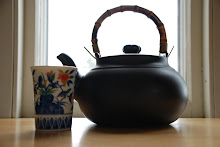
The first splat on ice of the winter. It was bound to happen, sooner or later. A light snowfall covered the hard ground with a powdery sheen, belying its slipperiness as I walked jauntily. Limbs flung in the air, I landed ignominiously in front of a noodle shop. During my momentary descent to the cement, lightning-quick thoughts flitted by: on what body part will I land, will I need to call my orthopedist colleague?
With a sigh of relief, I realized that I was still intact as I quickly got up and walked away. Except for a tingling sensation in my left arm from hitting my elbow on the ground, I was unscathed. This pratfall was not such a big deal after all.
But after this, I needed a tea that is both soothing and assertive and thought of the Pelikaan black tea languishing in my tea cabinet. The tea, made in the Netherlands, was a gift from a Dutch friend. She did not give us too much information on the tea other than it is quite famed regionally.
After piecing together information from disparate sources, I tried to weave a story of its provenance. The Pelikaan coffee and teahouse in the small city of Zutphen sells this tea and seems to attract a bit of tourism to the area.
I am not sure why I don't drink this tea more often as it has a lot going for it.
 Bergamot-flavored, this black Indian tasting (Darjeeling, perhaps?) tea is robust and brews a great eye-opening cup in the morning. However, it does have to compete with my beloved Keemun, now a staple of my morning drive to work.
Bergamot-flavored, this black Indian tasting (Darjeeling, perhaps?) tea is robust and brews a great eye-opening cup in the morning. However, it does have to compete with my beloved Keemun, now a staple of my morning drive to work.Retrieving the tea from the nether reaches of the kitchen, I inspected the pretty foil container. The incomprehensible Dutch writing stared back at me and I proceeded to brew the tea.
Several sips later, I thought that as fanciful as it may be, wouldn't it be a lovely story if a tea could really save a town from obscurity by putting it on the map?




No comments:
Post a Comment